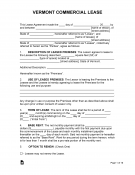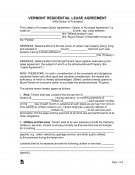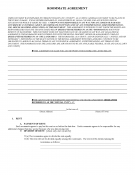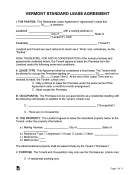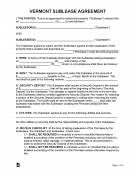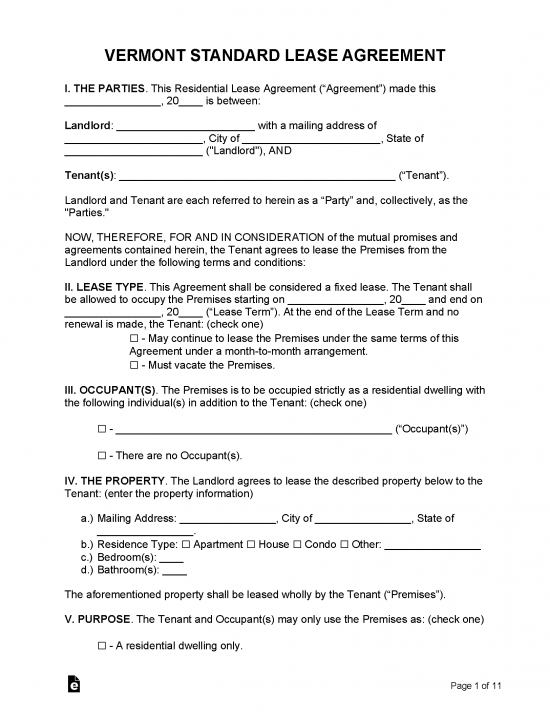Vermont lease agreements act as binding contracts between landlords and tenants. These written documents will contain key terms of a lease, such as the monthly rent, responsibility for utilities, and whether pets are permitted. Both parties should keep a copy of the lease agreement and refer to it in the event of a disagreement about their obligations.
Contents
By Type (6)
- Commercial Lease Agreement
- Month-to-Month Lease Agreement
- Rent-to-Own Lease Agreement
- Roommate Lease Agreement
- Standard Lease Agreement
- Sublease Agreement
Download: Adobe PDF, MS Word, Rich Text Format
Download: Adobe PDF, MS Word, Rich Text Format
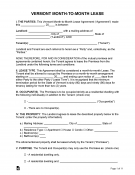 Month-to-Month Lease Agreement
Month-to-Month Lease Agreement
Download: Adobe PDF, MS Word, Rich Text Format
Download: Adobe PDF, MS Word, Rich Text Format
Download: Adobe PDF, MS Word, Rich Text Format
Download: Adobe PDF, MS Word, Rich Text Format
Landlord-Tenant Laws
Statutes – Title 9, Chapter 137 (Residential Rental Agreements)
Required Disclosures (1)
Lead-Based Paint Disclosure – If a landlord is leasing a property with a dwelling unit constructed prior to 1978, federal law requires that the landlord includes with the lease agreement a disclosure form describing the hazards of lead-based paints.
Security Deposit Laws
Maximum Amount ($)
Vermont state law does not limit the amount landlords may charge as a security deposit. However, the statute also expressly allows local governments to set security deposit maximums (§ 4461). The cities of Burlington and Battleboro, for example, permit landlords to charge no more than one (1) month’s rent as a security deposit. Landlords and tenants should consult the municipal code for the city of the unit.
Returning to Tenant
A landlord must return a security deposit to a tenant within fourteen (14) days of the termination of the tenancy. The landlord may retain all of a portion of the security deposit only for the following reasons: (i) to account for owed rent; (ii) to remedy damage to the property that occurred during the tenancy, other than normal wear-and-tear; (iii) to settle unpaid utility bills that the lease agreement made clear were the responsibility of the tenant; or (iv) to pay for the cost of storing a tenant’s personal property left behind after the termination of a lease.
If the landlord desires to retain all or a portion of the security deposit for these reasons, the landlord must provide a written statement document and explaining the amount. This statement also must be provided to the tenant within fourteen (14) days, and should be mailed, along with any remaining funds, to the tenant’s last known address (§ 4461).
When is Rent Due? (grace period)
Rent is due at the time and place specified in the rental agreement. There is no required grace period. (§ 4455)
Eviction Notice (non-payment)
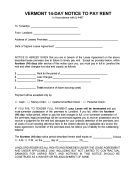 14-Day Notice to Pay or Quit – If a tenant fails to pay rent on the date it is due, the landlord may give this notice to the tenant or conspicuously post it on the tenant’s dwelling unit, informing the tenant that, if rent is not paid within fourteen (14) days of the date the notice is provided, the landlord may terminate the tenancy. The tenant may prevent the end of the lease by paying the amount owed during this two-week time period. (§ 4467)
14-Day Notice to Pay or Quit – If a tenant fails to pay rent on the date it is due, the landlord may give this notice to the tenant or conspicuously post it on the tenant’s dwelling unit, informing the tenant that, if rent is not paid within fourteen (14) days of the date the notice is provided, the landlord may terminate the tenancy. The tenant may prevent the end of the lease by paying the amount owed during this two-week time period. (§ 4467)
Download: Adobe PDF
Maximum Fees ($)
Late Rent Penalties
Late rent penalties are not permitted under the Vermont Supreme Court case Highgate Associates v. Merryfield. If a landlord wishes to assess a late fee, the fee must be named in the rental agreement, and must be reasonably related to the actual costs imposed on the landlord by late payment.
NSF Checks
A landlord who receives a rent check from a tenant with insufficient funds to carry it may seek damages of up to $50 (§ 2311).
Tenant’s Unclaimed Property
If a tenant has vacated a unit, either through actual notice to the landlord or through the scheduled end of the lease agreement, any personal property discovered left inside may be disposed of as the landlord sees fit. If a tenant has abandoned the property and the landlord encounters personal property of the tenant, other than garbage or refuse, inside, the landlord shall store the personal property in a safe, dry, secured location for at least sixty (60) days. The landlord must send the tenant a written notice stating that the property may be disposed of after the sixty-day time period has elapsed.
To claim the personal property, the tenant must provide (i) a written description of the item or items, and (ii) payment of reasonable costs incurred by the landlord in storing the property; the landlord, in turn, must make the property available to the tenant in a reasonable manner. If the tenant fails to claim the property within sixty (60) days, the tenant’s personal property becomes property of the landlord (§ 4462).
